Visa and Balkan Muslims - Kosovo Appeal by Amato and Schily - 10 years ESI
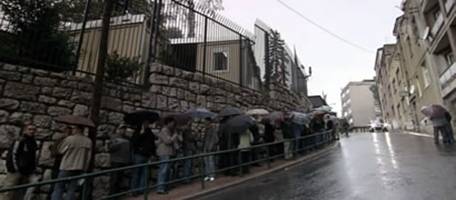 |
|
A visa queue outside the German embassy in Sarajevo |
Dear friends of ESI,
A wall is coming down at last
The importance of visa free travel for the people of the Balkans has been a constant theme of our work for years. It also runs like a red thread through all the films of our Balkan series Return to Europe.
The motto of the first trailer of the series is "No Balkan Ghetto – It depends on us!" In the film on Albania, young activists destroy a symbolic Schengen Wall. The film on Bosnia concludes with citizens waiting in the rain outside the Austrian embassy in Sarajevo and with a young musician venting his anger: "Only Europe knows why this is this way."
It is no surprise, therefore, that the recent European Commission proposal – suggesting visa-free travel for Macedonians, Montenegrins and Serbs from early 2010, leaving Albania and Bosnia-Herzegovina on the Schengen Black List, and placing Kosovo on it for the first time – is a serious disappointment for Bosnians, Albanians and Kosovars.
Is this, some of our friends ask, a reflection of anti-Muslim prejudice? Is it not immoral to deny relatives of Srebrenica victims the ability of travel freely? Some even question why "Serbs" should enjoy this right when "Serb victims" – Bosniaks and Albanians – will not.
ESI rejects this logic. First, because it suggests that those who have suffered deserve visa-free travel more than those who have not. Second, because it does not actually address the concerns that have led to the Schengen wall being built in the first place.
There was, after all, a moral case for letting Bosnian citizens travel to the EU without a visa already in 1995 (citizens of neighbouring Croatia never needed one)! There was a moral case for Kosovars, having survived a decade of apartheid, to travel visa-free at least since 1999. Or for Serbs, having toppled Milosevic in 2000. Or for Macedonians, having implemented the Ohrid Agreement and having created a multiethnic society, at least since 2002. (Is the absence of a comparable turning point the reason why Albania is often – unfairly – forgotten?)
However, arguing for visa-free travel based mainly on political morality convinced only those already convinced. More than a decade of such arguments did not deliver results. The wall stood.
Then something changed: the logic of the debate.
Two year ago some focused on the security advantages to the EU of getting rid of the visa requirements. Giuliano Amato, long-time interior minister of Italy, made the argument at an ESI meeting in early 2009: rather than imposing visa requirements, he said, EU interior ministers would prefer having better functioning police cooperation. This requires reforms in local law enforcement: meeting the conditions of the EU roadmaps.
The new logic was "strict but fair": the EU offers the region a deal with strict conditions; the region responds; and the result is a win-win alliance to improve security and mobility.
It has worked extremely well. Note that the roadmap process only started last year! As a result of the work by the Commission and serious efforts by regional leaders, 11 million Balkan citizens are about to be able to travel to the EU visa-free: another 8 million could be able to do so within a year.
Now the citizens of Bosnia and Albania need to put pressure on their governments to make sure they complete roadmap implementation. The European Commission needs to ensure that its assessments are transparent and not influenced by prejudice.
So far, this is working. We believe it will continue to produce results.
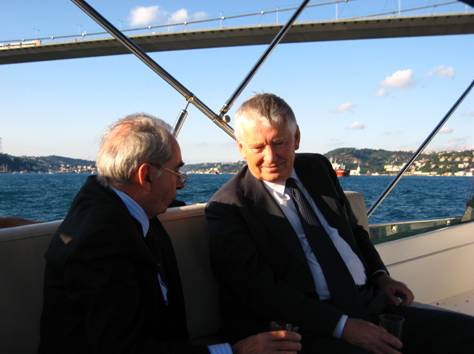 |
|
Giuliano Amato and Otto Schily (Istanbul ESI White List meeting, July 2009) |
A visa roadmap for Kosovo
There is only one serious problem in the Commission proposal: the absence of any process of "strict but fair" conditionality for the two million people of Kosovo.
The ESI White List project advisory board, led by Giuliano Amato and Otto Schily, welcomed the recent Commission proposal in an open letter "A Roadmap for Kosovo!", but noted:
"... we are disturbed by the fact that Kosovo has been left out of this process, a blanket visa requirement having been proposed for all of its residents, including those with Serbian citizenship – this, without any mention of a process that could possibly lead to this requirement being lifted.
.... Kosovo should also receive a visa roadmap. It must be given the opportunity to implement the same far-reaching reforms that the other five Balkan countries have set out to implement and to thus contribute to its own security, as well as to that of the entire region and the whole EU. Once Kosovo meets these conditions, the visa requirement should be abolished."
Amato, Schily and others reject the argument that all 27 EU member states have to recognise Kosovo's independence before another step can be taken:
"If Kosovo can be placed on the visa "black list" without an EU consensus on its status, then it can also be placed on the "white list" once it meets the necessary technical requirements. The visa liberalisation process should be considered status neutral by the EU."
A group of Kosovo's leading civil society representatives, Kosovo Serbs and Kosovo Albanians, makes a similar point:
"We are aware that EU member states disagree over the status of Kosovo. Indeed, the signatories of this letter also have different views on this subject.
However, we can all agree that leaving Kosovo residents, whatever their ethnicity, trapped in a visa ghetto, when all other Balkan people from the Adriatic to the Black Sea are able to travel freely, would be a disastrous policy."
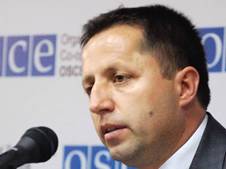 |
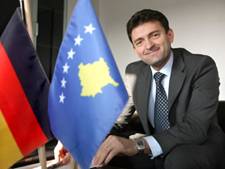 |
|
Zenun Pajaziti |
Vilson Mirdita |
"We are surprised. We cannot understand why the EU - which is divided on Kosovo status as we all know - can agree to put Kosovo on the Black Schengen list, but cannot agree to offer us a roadmap of conditions to meet in order to get to the White List, like all other countries in the region. This looks like discrimination against the citizens of Kosovo."
And Vilson Mirdita, Kosovo's Charge d'Affaires in Berlin, told ESI:
"The process has to start, now! If it does not I am afraid that Kosovo could fall behind the rest of the region, and that consequently people might feel compelled to fall back on clandestine solutions to travel to the EU."
The proposal by the Commission must not be the last word on the matter this year. There is time for EU countries to amend the Commission proposal before they adopt it. To leave things as they are would be a lose-lose situation for Kosovo, the region, and the EU.
Europe 1999 – 2009 – 2019
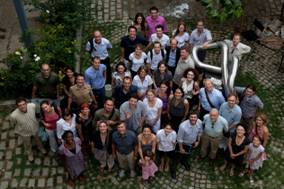 |
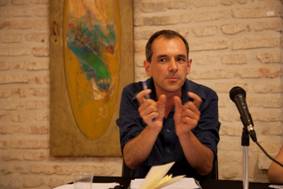 |
|
ESI 10th anniversary |
Kristof Bender (ESI Vienna) |
On 12 July 2009, ESI celebrated its 10th anniversary in Istanbul with a seminar on the state of democracy in the wider Europe - and on the role of think tanks in this new environment.
At the outset we looked at four maps: the EU in 1999 (when we first set up ESI in a cafe in Sarajevo); the EU in 2009; an enlarged EU in 2019 (having fulfilled its promises to current EU candidates/potential candidates); and the new European neighbourhood, between an enlarged EU and Russia.
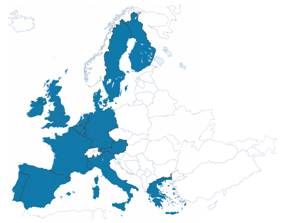 |
 |
|
the EU in 1999 |
the EU in 2009 |
 |
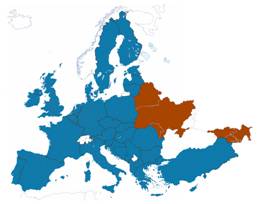 |
|
the EU in 2019 |
our contested neighbourhood |
What will it take for the EU to be as successful in promoting democracy, prosperity and stability in the coming decade as it has been in the most recent one? How to make the next enlargement a success... and how to stabilise the new neighbourhood?
At our event Michael Thumann and Amberin Zaman, correspondents for Die Zeit and The Economist, respectively, explored Turkey's ongoing democratisation. (For an update on Turkey's trial of the century, the Ergenekon case, see the recent Rumeli Observer entry).
Nicu Popescu presented the latest ECFR report on the European neighbourhood.
ESI Causasus analyst Arzu Geybullayeva spoke about challenges to democracy in Azerbaijan (for more – and for recent developments – see her blog Flying Carpets and Broken Pipelines).
ESI analysts Kristof Bender, Besa Shahini, Verena Knaus and Alex Stiglmayer spoke about the challenges facing enlargement in the Balkans (for this and more, visit our new ESI enlargement section – the Great Debate on Europe's borders – set to expand significantly in coming months with the support of the Austrian Erste Stiftung).
The Balkans, Turkey, the Caucasus and the future of enlargement have been and will remain the focus of our work in coming years.
For all of you who have accompanied us on our journey these past 10 years, be it as readers, donors or friends, we want to express our heartfelt gratitude.
Best regards,

Gerald Knaus
- NEW – Amato, Schily, Glenny, Krastev, Grabbe et alia A Visa Roadmap for Kosovo
- NEW – Kosovo Civil Society Appeal to EU parliamentarians and politicians
- NEW – ESI EU enlargement section
- NEW – Rumeli Observer: Is the EU Visa Proposal Anti-Muslim?
- NEW – Rumeli Observer: Justice and the Military in Turkey an Update
- NEW – Rumeli Observer: Where new ideas are born ESI 10th anniversary Story
